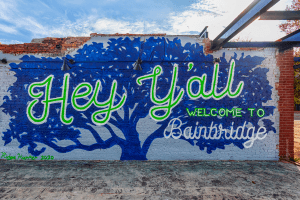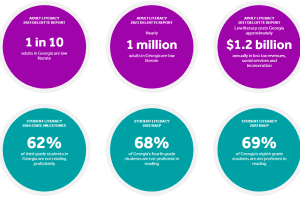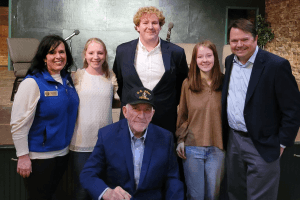
For nearly 100 years, the JB White department store was a fixture on Broad Street in downtown Augusta. But in 1978, the store relocated to a mall in the suburbs. The building lay dormant for decades.
That is, until 2007 when a developer wanted to buy the property and turn it into living and retail space. Thanks to the guidance of Margaret Woodard, executive director of Augusta’s Downtown Development Authority (DDA), he was able to apply for a $250,000 loan from the Georgia Cities Foundation’s (GCF) revolving loan program to jump start the project.
The total cost of the 80,000 sq. ft. project was $5.1 million and consisted of 52 condominiums, with retail on the first floor.
This project was the catalyst for what was to come: multiple development projects funded in part by GCF loans that helped revitalize downtown Augusta.
“Downtown has been transformed since 2007,” Woodard said. “It’s a much different place – there’s more downtown living units and retail, buildings have been restored and we have great foot traffic. We’ve made great headway in the last 20 years.”
The JB White project “got the ball rolling” and through a dedicated effort by the DDA promote the program, others took advantage of the loans. An historic building turned into office space and another that was a mix of residential and retail space followed in 2008. More improvements were to come. At the rate of one to two projects per year, the loans have helped fund the renovation or restoration of buildings that housed restaurants, retail space, apartment buildings and mixed use projects. Woodard said they have completed 18 loans projects since 2007 totaling $3.4 million with $20.4 million in total project costs. The latest loan closed at the end of 2024.

“The GCF loans have helped us get blighted properties that had been sitting vacant active again,” she said. “And these projects improve the downtown area, increase the tax base for the city, put new businesses in empty buildings and get more activity downtown. It also attracts new businesses because they see a thriving downtown.”
The GCF revolving loan program was created to support its member cities with their downtown revitalization efforts primarily by helping them find private sector investment. It was designed to partner with local banks to lower their risk so would be more likely to fund these projects. Since 1999, GCF has provided 206 loans to 63 cities across Georgia totaling $45.2 million. In turn, the loans have help fund $248.9 million in projects. These loans have facilitated projects that probably otherwise would not have been able to get off the ground.
“These loans are huge when you are an entrepreneur and trying to make something happen,” said Danny Bivins, a senior public service associate at the Carl Vinson Institute at the University of Georgia. Bivins, through the Georgia Downtown Renaissance Partnership, works with GCF and the Georgia Municipal Association to provide technical assistance to cities. “GCF has a better track record than private sector banks in supporting these projects. If they approve the loan, you know the business has a good chance of making it. Their track record is good. It’s a targeted loan program that knows what success looks like.”

Woodard said it is a win-win for the property owners and the banks. Borrowers get a low interest rate of 3.5%, and they must pay the banks first after the project is completed. These loans help facilitate larger loans from banks because there is less risk for the bank and fewer financial obstacles for the borrower. The city also benefits immensely.
“Historic renovations or renovations on buildings downtown can be much more expensive than constructing a new building,” Woodard said. “A $250,000 loan can make or break a project. The loan program has been very successful for Augusta. It has made a real difference.”




